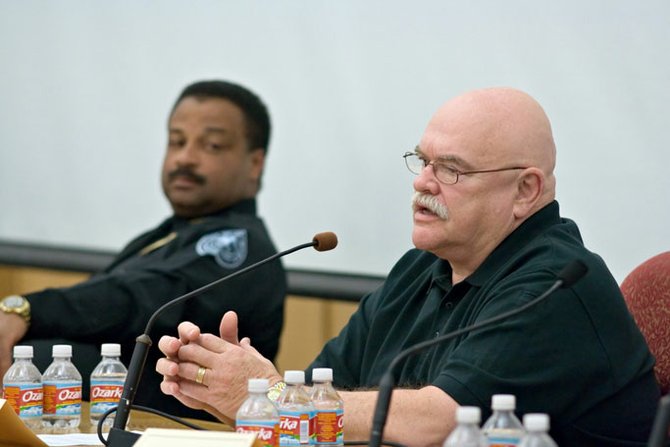Chief McMillin said he is trying to battle fuel costs and low morale this year. Photo by Kenya Hudson
The Jackson Police Department's 330 patrol vehicles are constantly on the move, requiring engines and components designed for longer idle periods and higher speeds than standard car models. That power and hardiness, however, takes a toll on fuel efficiency, especially when coupled with $4-a-gallon gas and patrol cars' typically long road hours.
An information request from the city reveals that the department's fuel expenditure this budget year was about $1,185,000 by mid July, with roughly half the year still left. By comparison, the department's fuel expenditure for all of 2007 was $1,252,000. The size of the fuel expense correlates precisely with the growing price of gas. The department's fuel costs for 2005, when gas averaged a little less than $3, was $980,000.
"We do what we can, but I can't make gas cheaper," Jackson Police Chief Malcolm McMillin told the Jackson Free Press.
Gas is generally a headache for McMillin. He is also the sheriff of Hinds County, and has to deal with the same fuel issues regarding deputies' patrol vehicles. The sheriff campaigned hard for a fuel budget increase in 2006 after strong debate with some supervisors. The board initially denied McMillin's request for an extra $58,750, though the sheriff won out in the end after framing his demand as a safety issue.
McMillin could not say whether he would be approaching the Jackson City Council with a request for a fuel budget increase, but said he was confident council members would "see reason" if he did.
Ward 6 Councilman Marshand Crisler said the high fuel cost came at a bad time, arriving on the heels of debate over raising police salaries.
"We're already looking at giving the police a raise or a better benefits package, and if they do go over budget on fuel expenditures, then we need to find out why it's so high," Crisler said. "If it's not all tied to the rising price of gas, we need to deal with it because that's money that could've gone to raises and benefits."
The council is considering raises at the end of the fiscal budget year this fall in hopes of stalling the department's high attrition rate.
The city currently has about 430 officers, though the number changes nearly every month. The city needs about 500 to adequately serve its population, and the staff shortage may be adding to the city's crime problems.
An information request for the city cumulative major crime report for 2008, compiled July 22, claim Jackson had 3,340 incidents of larceny, 2,052 incidents of burglary, 386 robberies and 860 auto thefts by that date. The information in the open records request (amounting to one page and costing the JFP $33) may have errors, however. The list also claimed 24 homicides by July 22, although media reported the city 35th homicide on July 20. The city suffered its 45th homicide Aug. 17, according to The Clarion-Ledger. Last year's total figure on homicides was 51. The city has not yet responded to more thorough information requests regarding this year's crime statistics.
JPD's new class of recruits will be graduating from the police academy in November to help fill the holes. McMillin said last week that the cadet dropout rate of the August class had slacked off and that 35 recruits would graduate. The chief added that he is taking steps to facilitate new applications by easing restrictions on the city's lateral transfer process, making the city's qualification requirements more closely mirror those of the state.
Salaries may be an issue though. Academy recruits make about $23,000 a year. Though they can make up to $30,000 within five years, McMillin says low morale works in conjunction with the salary range to increase attrition rates. That range, while higher than salaries for Hinds County deputies, compares unfavorably to that of many neighboring communities, especially when considering the stress of big city police work. McMillin said he would try to slow the department's attrition rate by conducting a department promotional test, which he said could raise morale and give current employees more reason to stay.
The chief said it would raise morale because too many officers were serving in a sergeant's capacity on the whim of a superior, rather than the merits of their abilities.
"After the test, we won't be relying on temporary promotions that are made by the chief after consulting with his command staff. A police officer will earn his promotion instead of being given it," McMillin explained, adding that he was still "working on the details" about financing the test. He said the council's blessing shouldn't be an issue so long as the department can handle the costs.
Last October, Mayor Frank Melton said he would administer the promotional test to officers serving in acting sergeant and lieutenant positions, although his announcement coincided with outcry from the police union about his promotion of his two personal bodyguards to sergeant and assistant chief weithout merit. Both he and his bodyguards are currently under federal indictment on unrelated charges.
McMillin came on as chief a few weeks later, and speculation on the examestimated by Melton to cost about $200,000ended for a time.



Comments
Use the comment form below to begin a discussion about this content.